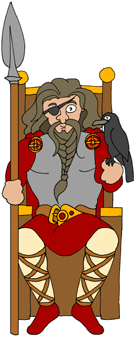|

|
|

Early Religion.

|
- When the Saxons
first settled in Britain,
they were pagans. This means that they worshiped lots of
different gods. Their religion was called 'paganism'.
- Before and during most of Roman
rule in Britain, the British had been
pagans too. Many of them became Christian though before the Saxons
arrived. The Picts and the Scots
were also pagans at this time.
- Each pagan god controlled a
particular part of everyday life: the home, growing crops, healing,
wisdom, metalworking, love, the weather, the family, war, day
& night and so on.
- There were lots of Saxon
gods.
Germanic people in Europe, like the Vikings, worshipped the same gods. They
sometimes gave
them slightly different names.
- Most of the days of the week are
named after Saxon gods. Can you work out which ones?
- The Saxons worshipped their gods in
wooden temples or sacred clearings in the woods called 'groves'.
- Pagan Saxon priests practiced magic
and fortune telling and gave out charms to help people, like
against disease or for recovering stolen things. Charms usually
had an incantation (a spell) and a potion or an ointment to be
taken.
- People wore amulets around their
necks or put them in their homes. This was usually for good
luck.
- They might be animal teeth or
bones (like bears or wolves) which were thought to give the
person the strength of the animal.
- They might be symbols of the
gods, like Thunor's hammer or
club.
- They might be fossils or
shells.
- The pagan Saxons also believed that
the countryside was inhabited by elves, goblins, dwarves and
dragons.
- And that, after death, you had a
long journey ahead of you to an 'after-life'.
- When the Saxons became
Christians,
they often turned their temples into churches and
made pagan
festivals Christian. This stopped pagans using them and showed
that Christianity was stronger. Amulets became crosses.
- Activity
Sheet Available.
|
|

